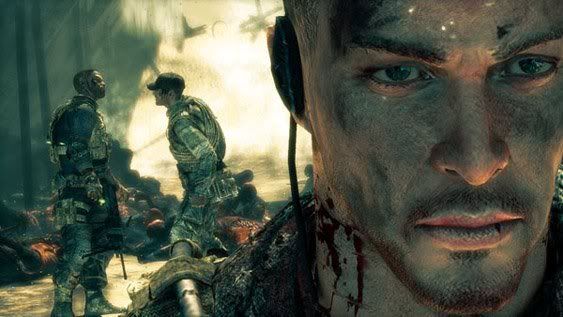This post has not been edited by the GamesBeat staff. Opinions by GamesBeat community writers do not necessarily reflect those of the staff.
 As is to be expected, there’s been a lot of talk about the violence of video games lately. News reports foolishly trying to pin some of the blame for recent tragedies on violent games. Politicians and lawyers condemning these games for having such an effect on us (even though, they have been proven time and time again to not have said effect). Most of the talk I’ve seen has been from other games writers who are weighing in on how they feel game violence affects them. These have been the most insightful posts in my eyes, self-reflective pieces that give interesting looks into the reasons why we tolerate insane levels of violence and gore in our games. As such, I felt like weighing in myself.
As is to be expected, there’s been a lot of talk about the violence of video games lately. News reports foolishly trying to pin some of the blame for recent tragedies on violent games. Politicians and lawyers condemning these games for having such an effect on us (even though, they have been proven time and time again to not have said effect). Most of the talk I’ve seen has been from other games writers who are weighing in on how they feel game violence affects them. These have been the most insightful posts in my eyes, self-reflective pieces that give interesting looks into the reasons why we tolerate insane levels of violence and gore in our games. As such, I felt like weighing in myself.
My exposure to violent games, particularly M-rated ones, started fairly early. I was allowed to start playing them at around 12 or 13 years of age. Note that I did say allowed. My parents did monitor what I was playing, at least up to that point, and made the decision to allow me to start playing M-rated games. They knew that I was mature enough to handle the adult content and didn’t give it a second thought. I don’t remember back that far very well, but if I had to guess, I would say that the me of that time didn’t even care about the fact that those games had violence. He didn’t want to play those games because he could blow off people’s heads or hear curse words scattered throughout the dialogue; he just wanted to play every game he could get his hands on.
Many of these posts from other games writers bring up some stories they have about moments in their lives where maybe video games did have an influence on them in some negative way. I would like to recount such a tale for you myself, but I don’t really have any. I was a very well-behaved child: I never got detention at school, was a straight-A student always, treated my parents with complete respect, and never did anything more violent than throwing a controller in a fit of annoyance (with myself, usually). I completely understand that games and reality are different and, to the best of my knowledge, am perfectly sane.
I think I know why I don’t have any of these stories to tell. To me, games have always been just that – a game. It’s very hard for me to keep a constant analytical eye when playing a game, as my mind has a tendency to slip into a more relaxed state and start going through the motions (something that makes writing about games tricky at times). I didn’t (and still don’t) pick out games because they were over-the-top violent or unbelievably crass; I pick games that look fun to play or seem interesting in some way. I can’t really think of any time in my life where I blew some NPC’s head off with a shotgun and said “Awesome!” or “That was sick!” Every dead enemy to me just meant I was one step closer to my goal, pleasure centers in my brain firing as I accomplished the tasks given to me by the game. Violence has never thrilled me in a game; it has either not registered at all or disgusted me when it was violent enough.
Maybe that’s the problem I have with violent video games. Until recently, with games like Spec Ops: The Line (and Brendan Keogh’s amazing Killing is Harmless covering it), I never really stopped to think about how much violence exists in this form of media I spend so much time with. At this point in my gaming career, I must have murdered hundreds of thousands of virtual men. On most days, this fact doesn’t even register to me. I was only shooting the 1s and 0s created by the game to get that sensation of pleasure I so desire. It’s been that way from the beginning.
Maybe games didn’t desensitize me to violence. Maybe I was already desensitized before they got there, my logical brain already rationalizing away the horrible acts I committed in games on a daily basis. Maybe.
